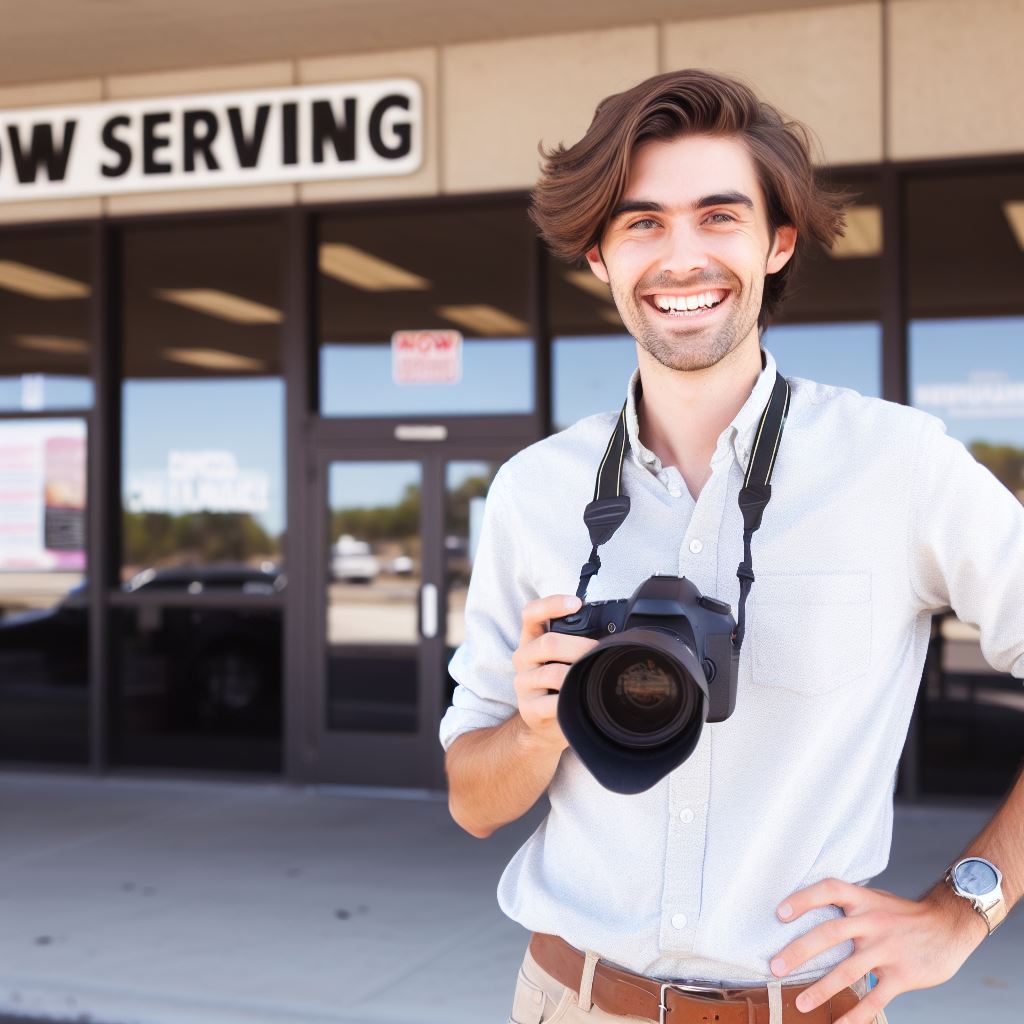Legal Essentials: Licensing & Permits for US Photographers
Last Updated on November 9, 2023
Introduction
Photographers in the US need to understand the importance of licensing and permits for their profession.
This blog section will provide an overview of this topic, guiding photographers through the necessary legal essentials.
Importance of licensing and permits for US photographers
Licensing and permits are crucial for US photographers as they ensure compliance with legal requirements. Operating without them can lead to fines, penalties, and potential legal liabilities.
Overview of the topic
Photographers need to understand the various licenses and permits needed in their specific location. They must adhere to state, county, and city regulations, which may vary.
First, photographers must obtain a business license, which allows them to legally operate their photography business. This license verifies that photographers are registered and compliant with tax and legal obligations.
Additionally, photographers often require permits when shooting in public places, national parks, or private properties.
These permits grant them permission to use certain locations and protect them from potential liability issues. Intellectual property rights are another key consideration.
Obtaining copyrights for their work ensures photographers’ exclusive rights to reproduce, distribute, or display their photographs, safeguarding their creative efforts.
Furthermore, if photographers plan to sell prints or merchandise, they may need a sales tax license to collect and remit sales tax to the appropriate government agencies.
Lastly, photographers should have liability insurance. This protects them from any legal claims arising from accidents, property damages, or injuries related to their photography business.
In general, understanding and acquiring the necessary licenses and permits is vital for US photographers.
It not only ensures compliance with legal requirements, but also protects their business, creative work, and reputation.
By following these legal essentials, photographers can focus on their passion while operating within the bounds of the law.
The role of licenses and permits
Definition and purpose of licenses
- Licenses are legal documents that grant photographers the right to legally operate their business.
- They are necessary to ensure that photographers comply with the laws and regulations of their state.
- Photographers need licenses to protect themselves and their clients from potential legal disputes.
Different types of permits required
Business licenses
- A basic requirement for photographers to legalize their business operations.
- It provides the legal framework for photographers to offer their services and receive payment.
- Failure to obtain a business license can result in fines, penalties, and even closure of the business.
Sales tax permits
- Pertinent for photographers who sell prints, albums, or other physical products.
- It authorizes them to collect sales taxes on products sold and remit them to the appropriate authorities.
- Sales tax permits ensure photographers comply with tax laws and avoid legal consequences.
Occupational licenses
- Some states require photographers to obtain occupational licenses specific to their field.
- These licenses generally ensure that photographers possess the necessary skills and qualifications.
- They often involve passing an exam or meeting certain experience requirements.
Special permits for certain activities (e.g., drones)
- If photographers plan to use drones for aerial photography, they must obtain special permits.
- These permits are essential to ensure safety, privacy, and compliance with aviation regulations.
- Operating drones without proper permits can lead to severe legal consequences.
How licenses and permits ensure legality and professionalism
- Licenses and permits provide legal recognition and credibility to photographers, distinguishing them as professionals.
- They assure clients that the photographer adheres to industry standards and complies with legal requirements.
- Obtaining licenses and permits demonstrates a commitment to professionalism, competence, and ethical behavior.
- Government agencies and professional organizations often oversee the licensing process, ensuring photographers follow guidelines.
- By obtaining licenses and permits, photographers contribute to a regulated industry that protects both professionals and clients.
Read: Earning Potential: Average Photographer Salaries in the USA
Business license requirements
Federal requirements
1. Obtaining an Employer Identification Number (EIN)
In order to operate your photography business legally in the United States, you need to obtain an Employer Identification Number (EIN).
This number is used for tax purposes and helps the government track your business earning and employment.
2. Registering your business name
Another important step is to register your business name. This ensures that no one else can use the same name and helps establish your brand identity.
3. Understanding fe deral tax obligations
As a professional photographer, you must understand and fulfill your federal tax obligations. This may include paying income tax, self-employment tax, and any other applicable taxes.
State requirements
1. Registering your business with the Secretary of State
It is important to register your photography business with the Secretary of State in the state where you operate. This provides legal recognition and protects your business name from being used by others.
2. Determining if a separate business license is necessary
In addition to the basic registration, you may need to obtain a separate business license depending on your state’s regulations. This license ensures that you comply with all local laws and regulations.
3. State-specific tax obligations
Each state has its own tax obligations that photographers must adhere to. This may include sales tax, use tax, and other state-specific taxes.
It is crucial to understand and fulfill these obligations to avoid legal issues.
As a photographer, it is vital to understand and fulfill the necessary licensing and permit requirements to operate your business legally in the United States.
Failing to comply with these requirements may result in penalties, fines, or even the closure of your business.
By following the federal and state guidelines, you can ensure that your photography business is on the right track.
Read: Top Photography Schools in the USA: A Comprehensive Guide
Sales tax permits for photographers
Importance of collecting and remitting sales tax
- Collecting and remitting sales tax is crucial for photographers as it ensures compliance with the law.
- Failure to collect and remit sales tax can result in penalties, fines, and legal issues.
- It demonstrates professionalism and integrity in business operations.
State-specific requirements for sales tax permits
- Each state has its own regulations regarding sales tax permits for photographers.
- It is essential to understand the specific requirements of the state(s) in which you operate.
- Researching and staying updated on state-specific requirements will help you avoid any potential legal complications.
Understanding nexus and when you need to collect sales tax
- Nexus refers to the connection between a business and a state, determining whether you are required to collect sales tax.
- Nexus can be established through physical presence, economic activity, or other factors depending on the state.
- It is crucial to understand your nexus status and determine whether you need to collect sales tax in different states.
Sales tax permits are vital for photographers, ensuring legal operation and projecting professionalism. Compliance with state-specific requirements is essential to avoid penalties and legal issues.
Understanding nexus, the connection between business and state, helps determine when to collect sales tax. Stay informed about changing nexus rules, especially if operating in multiple states, to avoid consequences.
In essence, sales tax permits are crucial for US photography businesses, ensuring compliance, professionalism, and legal integrity.
Familiarize yourself with state-specific requirements and understand your nexus status to collect sales tax appropriately.
Stay informed to uphold the legal essentials of your photography business and avoid potential complications.
Read: The Evolution of Photography in the USA: A Historical View

Occupational licenses and credentials
Professional organizations and certifications for photographers
Being a part of professional organizations and earning certifications can enhance a photographer’s career.
- Professional organizations provide networking opportunities and access to valuable resources and education.
- Certifications validate a photographer’s expertise and skills, boosting their credibility and marketability.
- Examples of professional organizations for photographers include the Professional Photographers of America (PPA) and the National Press Photographers Association (NPPA).
Licensing requirements for specific photography niches (e.g., wildlife, fashion)
Photographers specializing in certain niches may need additional licenses and permits to operate legally.
- Wildlife photography often requires permits to photograph protected species or within specific wildlife reserves.
- Fashion photographers might need permits for shooting on private properties or public spaces.
- Researching and understanding the licensing requirements for a specific niche is crucial to avoid legal issues.
Advantages of obtaining occupational licenses and credentials
- Legal compliance: Holding the necessary licenses ensures photographers are operating within the law.
- Professionalism: Licenses and credentials demonstrate a photographer’s commitment to their craft and adherence to industry standards.
- Competitive edge: Having licenses and credentials sets photographers apart from their peers and can attract more clients.
- Trust and credibility: Clients are more likely to trust a licensed photographer, knowing they have met certain standards and qualifications.
- Access to exclusive opportunities: Some assignments or projects may only be available to photographers with specific licenses or credentials.
- Networking and learning: Membership in professional organizations provides photographers with opportunities to network with industry professionals and attend workshops and conferences.
- Growth and development: Continuing education and training through professional organizations can help photographers refine their skills and stay updated on industry trends.
Generally, occupational licenses and credentials play a significant role in the photography industry.
Being part of professional organizations, understanding licensing requirements for specific niches, and obtaining necessary permits offer photographers numerous benefits.
From legal compliance to professional growth and increased opportunities, licenses and credentials are essential for photographers who aim to thrive in the field.
Read: Design Considerations for USA’s Diverse Climates
Special permits for specific activities
When it comes to certain activities or types of photography, photographers may need to obtain special permits to comply with legal requirements. Here are some examples:
Drone operation requirements and permits
- Operating a drone for commercial purposes requires a Remote Pilot Certificate from the FAA.
- Photographers must also register their drones with the FAA before operating them.
- Specific rules and regulations regarding drone operation must be followed to ensure safety and privacy.
- Some areas, such as national parks or airports, have restricted airspace where drone operation is not allowed.
- It is important for photographers to research and understand all the necessary permits and regulations before using drones for photography.
Filming permits for commercial or public photography
- Commercial photographers who intend to film in public spaces or private properties often require filming permits.
- The requirements for obtaining these permits may vary depending on local government regulations.
- Photographers may need to provide details about the duration, location, and purpose of the filming to obtain the permit.
- These permits help ensure that photographers follow specific guidelines and regulations for public safety and property protection.
- Failure to obtain the necessary permits may result in legal consequences or restrictions on the use of the captured footage.
Restrictions and regulations for photographing copyrighted material
- Photographers must be aware of copyright laws when capturing copyrighted material, including artistic works or trademarked images.
- Generally, photographers need permission from the copyright owner to use or reproduce copyrighted material.
- Photographing copyrighted material for commercial purposes may require a license or agreement with the copyright holder.
- It is crucial to respect intellectual property rights and seek proper authorization to avoid legal issues.
- Photographers should also be cautious when photographing people or private properties, as privacy rights may apply.
Understanding and complying with special permits and regulations is essential for photographers aiming to operate legally.
By obtaining the necessary permits and licenses, photographers can protect their work, respect copyright laws, and ensure the safety of others.
Common challenges and issues
The cost associated with obtaining licenses and permits
- Photographers face various costs when obtaining licenses and permits for their photography business.
- These costs include application fees, processing fees, and sometimes even professional certification fees.
- It is important for photographers to budget for these expenses as they can vary depending on the jurisdiction.
- Additionally, photographers may need to invest in equipment or training to meet the requirements for certain licenses.
- Failure to properly budget for these costs can lead to financial strain and delays in the licensing process.
Navigating complex state-specific regulations
- Photographers often find it challenging to navigate the complex regulations that vary from state to state.
- Each state has its own set of requirements for obtaining licenses and permits, which can be time-consuming and confusing.
- Photographers must research and understand the specific regulations in their state to ensure compliance.
- These regulations may include specific documentation, testing, or even residency requirements that must be met.
- Professional associations and photography organizations can provide guidance and resources to navigate these complexities.
Updates and renewals of licenses and permits
- Once a photographer obtains their licenses and permits, it is crucial to stay updated on any changes or renewals required.
- Regulations surrounding photography businesses can change over time, and photographers must stay informed to maintain compliance.
- Failure to renew licenses and permits in a timely manner can result in fines, penalties, or even the suspension of the photography business.
- Photographers should establish a system to track renewal dates and ensure they are submitted promptly to avoid any setbacks.
- Regularly checking with the licensing authority or professional associations can help photographers stay updated and avoid any issues.
Conclusion
Recap of the importance of licensing and permits for US photographers
Licensing and permits are critical for US photographers as they ensure legal compliance and protect their work and reputation.
By obtaining the necessary licenses and permits, photographers can operate their businesses without the fear of legal repercussions.
Encouragement to fully comply with legal requirements
It is vital for photographers to fully comply with legal requirements, not only to avoid penalties but also to establish themselves as reputable professionals in the industry.
By respecting copyright laws and obtaining the proper permits, photographers can build trust with clients and colleagues.
Resources for finding more information on specific licensing and permitting processes
For photographers seeking more information on specific licensing and permitting processes, various resources are available.
They can consult local government websites, professional organizations, and legal experts specializing in photography laws.
These resources will provide a comprehensive understanding of the necessary steps and requirements for obtaining licenses and permits.
In summary, licensing and permits are crucial for US photographers, ensuring legal compliance and safeguarding their work.
By fully complying with legal requirements, photographers can establish themselves as reputable professionals and build trust within the industry.
Utilizing available resources will further assist photographers in navigating the licensing and permitting processes effectively.


